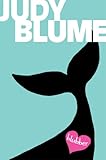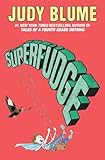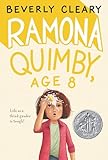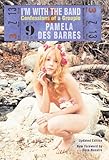1.
I found the paperback on a metal card table at my neighbor’s garage sale: Judy Blume’s Then Again, Maybe I Won’t. I was 8 years old and already loved the author for books like Blubber, Tales of a Fourth Grade Nothing, and Superfudge. The well-worn paperback cost a quarter, which I handed over to my neighbor and babysitter, Cheryl. The cover held an image of a boy with binoculars. Color me intrigued. I was already engrossed in the story (about spying on a female neighbor as she undresses in her room across the street) when the doorbell rang. Cheryl conferred with my mother: that book I’d bought? It wasn’t exactly appropriate for a kid my age. I was summoned to the door. This babysitter/traitor held out the quarter in one hand, and we undid the deal. Sold out by the very one whose ranks I had hoped to join.




 She tossed her feathered hair and all but wagged her finger at me. Maybe she thought her babysitting job was on the line. Maybe my mother wouldn’t have cared what I was reading. But my mom trusted Cheryl, and the two of them were conspiratorial, chuckling at my choice of reading material. Isn’t she precocious! I seethed inside, mortified. Did they think I was interested in spying on people as they undressed? (Was I?)
She tossed her feathered hair and all but wagged her finger at me. Maybe she thought her babysitting job was on the line. Maybe my mother wouldn’t have cared what I was reading. But my mom trusted Cheryl, and the two of them were conspiratorial, chuckling at my choice of reading material. Isn’t she precocious! I seethed inside, mortified. Did they think I was interested in spying on people as they undressed? (Was I?)
I vowed to read the book anyway. At the library I gulped down the whole thing in one sitting. Later I read every Judy Blume book I could find. Are You There God? It’s Me, Margaret was my introduction to the realities of menstruation, a puberty bible for girls growing up in the 1980s. When I found out that the book was frequently challenged or banned, all I could think was, “Why? Why would people want to prevent me from knowing about myself?”
As readers, we get to decide whether to accept or reject the knowledge that books contain. My youth was spent reading novels like they were life manuals for some future me, divining what was to come, even if I couldn’t see or imagine it yet. Even if my babysitter didn’t think I was ready. I didn’t want anyone’s laughter or condescension at my choices, so I read covertly, sneakily, my stack of library books bookended by less controversial titles. I love you on your own merits, Ramona Quimby, Age 8, but with the most gratitude for acting as my cover story.
 2.
2.
Preteen years, late 1980s mall era, bangs shellacked with hairspray. Saturday nights, I’d go with my family to Waldenbooks or B. Dalton Booksellers. I could pick out three or four books at a time, depending on the price, and chip in my allowance if I wanted more. Browsing bookshelves with my family is one of my happiest childhood memories, no doubt one reason I wanted to become a writer. “Ready to check out?” my dad asked one Saturday, holding his stack of scholarly writing on King Arthur. I handed him two of the latest in the Sweet Valley High series, while slipping a third book behind my back. “I’m going to browse some more,” I lied. If he saw my copy of Girltalk about Guys by Carol Weston, he mercifully pretended not to. I’d been scoping out this book for weeks, visiting it, my footsteps muffled on the tan carpet. Standing with my back to the aisle, I’d read and reread the section on how to talk to guys. How to be confident. Not unrelated, the sections on looking and feeling your best.
All of it was urgent and mysterious and not-something-I-could-talk-about. If puberty was a transitional time from caterpillar to butterfly, I was still trapped in the cocoon, gawky limbs pushing to get out. I’d had enough skulking around the bookstore: This was a book I needed to own and read privately. Avoiding eye contact with the cashier, I made my purchase. After, we went to Sizzler, but my mind was elsewhere. I wanted to spend the rest of the night reading in my room, which I did as soon as we’d finished our steaks and baked potatoes and salads. The book promised real questions and real answers, and the Q&As revealed the best truth of every good advice column: that many, many other people out there shared similar problems. People like me, more comfortable asking a stranger to explain what was going on with zits, extreme emotions, body hair, and social life. Not to mention tampons: What the hell? I was filled with questions I didn’t know how to ask, and questions I didn’t know I had. Weston already knew, understood, and answered. Life thus far had taught that these were taboo topics, so I kept the book hidden in my closet, swaddled in the blankets of my old doll’s bassinet. I took that book baby out as often as possible, always with my bedroom door shut, the book’s open pages like some kind of new door.
 3.
3.
A few years later, my older sister Katie bought a copy of I’m With the Band by Pamela Des Barres, which she stashed under her bed to keep me from hogging it. This memoir of a 1960s-70s rock groupie was clearly not my property. I noted when Katie would be at band practice (marching, not rock, at a Catholic high school), and raced through the racy pages. There was sex and rock and roll and pining and more sex and drugs and tons of gossip about musicians I loved. One of the rock stars who blurbed the book was Robert Plant, offering “again a thousand apologies for the premature ejaculation.” Not just entertainment, but education. Sex ed aside, this was a time period I wanted to learn more about. I was born six years after Woodstock but taped a concert poster to my wall as if I’d been there. I read everything I could about the era, especially related to music. Des Barres, obsessed somewhat differently, set out in Los Angeles to unapologetically conquer as many rock stars as she could. I was miles away from this lifestyle in every possible sense: geographically, emotionally, physically. But vicarious experience was, to use the parlance of Des Barres, delectable. By turning pages, you could run the gamut of experiences (and yes, the STDs) without having to face any emotional consequences or itching.
I read the tell-all at least a dozen times. “Give it back,” Katie said when I admitted I’d pilfered her paperback again, because she wanted to reread it. Not surprisingly, there was fallout for the author: On the talk show circuit, Des Barres defended herself from would-be slut-shamers. What of the male musicians she became involved with, I wondered? The power balance might’ve been skewed, but this was the memoir of a woman who controlled her own choices and went after what she desired. She was candid about her heartbreaks, too, airing her life for all the world to see. That took guts. That bravery inspires me now, some 25 years later, writing about books that once seemed worth hiding. Books that could’ve been banned from libraries or by family and kept out of my hands. Books that helped me understand the world and myself, both in constant states of change. Women writers who inspired me to write my own books, about topics others may want to challenge. Look. I want to show you.









